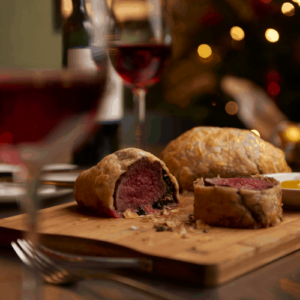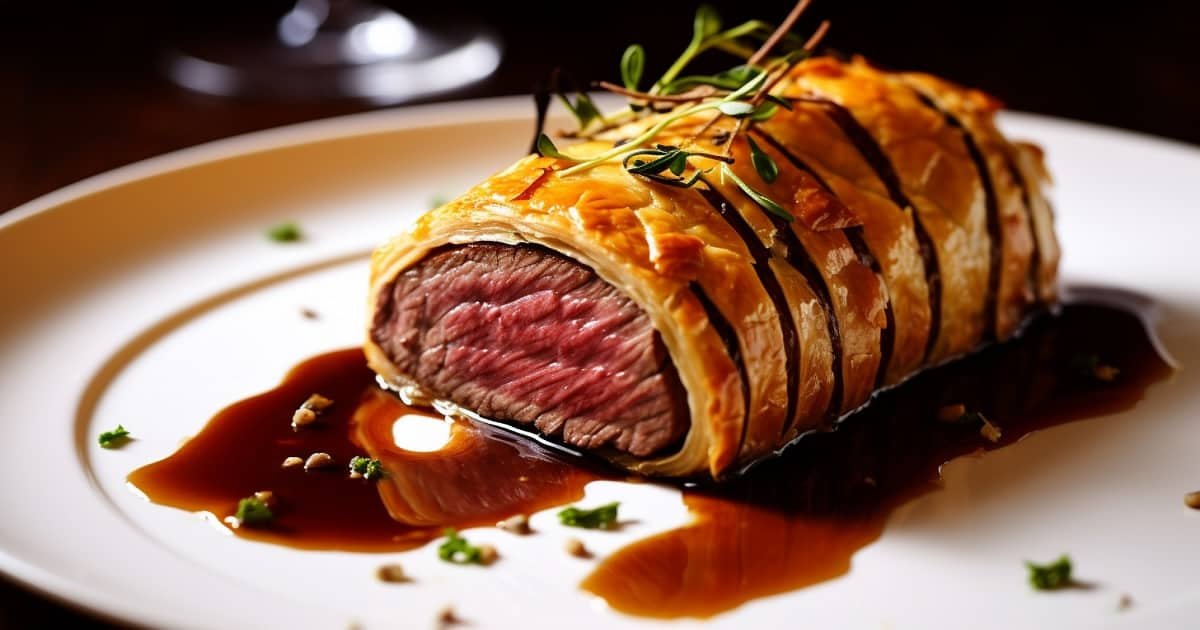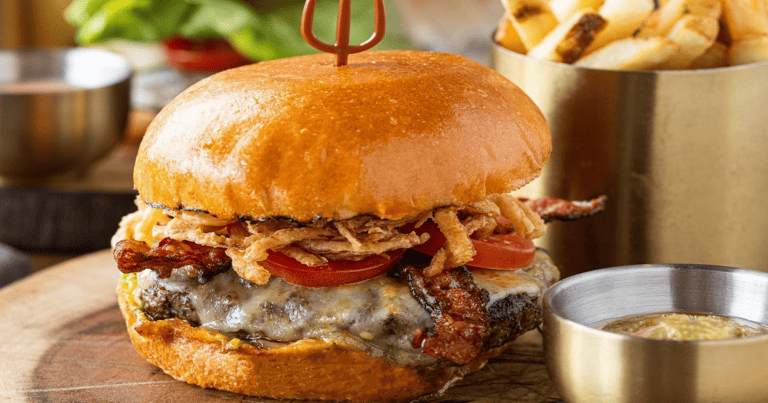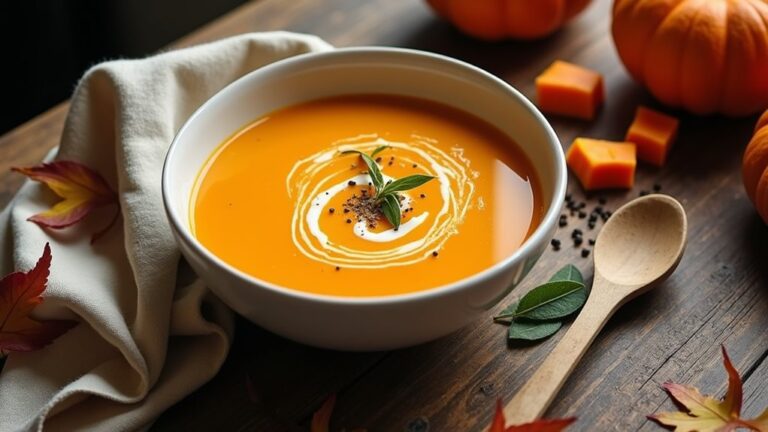Gordon Ramsay’s Guide to Perfect Beef Wellington, Savor the Elegance is an exquisite recipe that beckons the bold and the discerning. In the sophisticated world of fine dining, Beef Wellington stands as a titan, renowned for its layers of flavor and majestic presentation. Each slice unveils a constellation of textures, from the tender, flavorful beef tenderloin to the rich duxelles and the salty prosciutto, culminating in the flaky, golden crust.
Whether you’re a seasoned chef or a culinary enthusiast, Ramsay’s timeless techniques promise to elevate your cooking repertoire, transforming your kitchen into a stage for gastronomic excellence. Follow us step by step as we delve into the secrets behind this luxurious dish, a testament to the art of cooking and a celebration of gustatory elegance.

Beef Wellington Recipe
Ingredients
For the Beef Wellington:
- 2 lb Center-cut beef tenderloin, room temperature
- 8 slices prosciutto
- 1 lb sheet puff pastry, thawed if frozen (Gluten-free tip: you can buy gluten-free puff pastry online.)
- Sea salt
- Freshly ground black pepper
- 2 tbsp grapeseed oil
- 2 tbsp Dijon mustard
- 2 egg yolks
FOR THE MUSHROOM DUXELLES:
- 6 tbsp olive oil
- 4 portobello mushrooms, finely diced
- Salt
- teaspoon Freshly ground black pepper
- 2 sprig thyme leaves
For the Red Wine Sauce:
- 2 tbsp olive oil
- 7 oz beef trimmings
- 4 large shallots, peeled and sliced
- 12 black peppercorns
- 1 bay leaf
- 1 sprig thyme
- A splash of red wine vinegar
- 3 1/3 cups red wine
- 3 1/3 cups beef stock
Instructions
For the Beef Wellington:
- Season the beef fillets with sea salt and freshly ground black pepper.
- Heat olive oil in a large pan over high heat. Sear the beef fillets on all sides until they are nicely browned. Remove them from the pan and allow them to cool.
- In the same pan, add a bit more olive oil if needed. Add the chopped wild mushrooms and thyme leaves. Sauté them until they release their moisture and become brown. Remove from heat and let them cool.
- Lay out a large sheet of plastic wrap and place the Parma ham slices on it, slightly overlapping, to create a ham layer. Spread the cooled mushroom mixture over the ham.
- Place the seared beef fillets on top of the mushroom mixture.
- Carefully roll the ham and mushroom mixture around the beef fillets, using the plastic wrap to help shape it into a tight cylinder. Twist the ends of the plastic wrap to secure the cylinder shape. Refrigerate for about 20 minutes to firm it up.
- Roll out the puff pastry on a floured surface to a size that can completely encase both beef fillet cylinders.
- Remove the plastic wrap from the beef and place each beef cylinder in the center of the puff pastry sheet.
- Brush the edges of the pastry with the beaten egg yolks and fold the pastry over the beef, sealing it tightly. Trim any excess pastry.
- Brush the entire pastry with more egg yolk mixture for a golden finish.
- Preheat your oven to 400°F (200°C). Place the Beef Wellingtons on a baking sheet lined with parchment paper.
- Bake in the oven for about 20-25 minutes or until the pastry is golden brown and the beef is cooked to your desired doneness (medium rare is recommended).
For the Red Wine Sauce:
- Heat olive oil in a saucepan over medium-high heat. Add the beef trimmings and sear them until browned.
- Add the sliced shallots, bay leaf, and thyme sprig. Sauté until the shallots are softened.
- Splash the red wine vinegar to deglaze the pan, scraping up any browned bits.
- Pour in the red wine and beef stock. Bring the mixture to a boil, then reduce the heat and let it simmer until the sauce has reduced by half and thickened.
- Strain the sauce through a fine mesh strainer into a clean saucepan.
- Keep the sauce warm until serving.
- Serve the Beef Wellington in thick portions and drizzle the red wine sauce over each slice. Enjoy your delicious Beef Wellington with Wild Mushrooms and Red Wine Sauce!
Video
Notes
What is so special about Beef Wellington?
Beef Wellington is a special dish known for its rich history and elegant presentation. It features a succulent fillet steak coated with pâté and duxelles, a mixture of finely chopped mushrooms, shallots, and herbs. The steak is then wrapped in Parma ham or prosciutto and encased in golden puff pastry. This combination of textures and flavors makes Beef Wellington a luxurious dish often reserved for special occasions.
Is Beef Wellington the hardest dish to make?
While Beef Wellington is not necessarily the hardest dish to make, it can be challenging even for experienced cooks. The difficulty lies in achieving the perfect balance of cooking the beef to the desired doneness, ensuring the mushrooms are moisture-free to prevent a soggy pastry, and baking the puff pastry until it is flaky and golden without overcooking the meat inside. This requires precise timing, technique, and attention to detail.
What cut of meat is used for Beef Wellington?
The traditional cut of meat used for Beef Wellington is the beef tenderloin, also known as filet mignon, when cut into steaks. This cut is prized for its tenderness, as it comes from a muscle that does very little work, making it one of the most tender parts of the cow. When preparing Beef Wellington, the tenderloin is often seared to develop flavor before being wrapped in pastry and baked.
Why are beef Wellingtons so expensive?
Beef Wellingtons are expensive for several reasons:
- High-quality Ingredients: The dish typically requires a high-quality cut of beef, such as the tenderloin, one of the cow’s most expensive parts. Additionally, including other premium ingredients like pâté (which can contain foie gras) and truffles increases the cost.
- Labor-Intensive Preparation: The preparation process for Beef Wellington is quite laborious and time-consuming. Assembling the layers requires precision and skill without compromising the integrity of the pastry or overcooking the meat.
- Presentation and Occasion: The presentation of beef in Wellington, often associated with fine dining and special occasions, contributes to its high cost. Restaurants that serve the dish also factor in the ambiance and service when pricing it.
As we wrap up this culinary journey, it’s clear that mastering Gordon Ramsay’s Beef Wellington is an achievement that epitomizes fine dining at its best. Rich with history, layered in flavor, and demanding in technique, the dish is a testament to your dedication and love for cooking. With every delicate slice, you are not just serving a meal but presenting a piece of tradition refined by Ramsay’s meticulous standards.
Whether you’re hosting a grand soiree or simply seeking to satisfy your gourmet cravings, this Beef Wellington recipe, adapted from Ramsay’s repertoire, will leave a lasting impression on any palate. As the final notes of the red wine sauce blend with the succulent beef and flaky pastry, savor the symphony of flavors and the standing ovation that is sure to follow. Here’s to your success in the kitchen. May your Beef Wellington be as delightful to the taste buds as it is pleasing to the eye.




